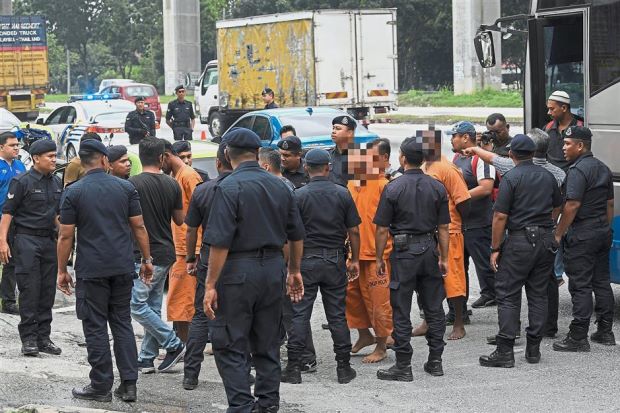‘We are doing the same thing once again’

(THe Star) – Using draconian preventive laws to handle the Seafield Sri Maha Mariamman Temple fracas is a bad move, said civil groups and a human rights commissioner.
The Penal Code has enough provisions to deal with threats of violence, they argued, warning that the use of excessively harsh laws went against the Pakatan Harapan government’s aim to do away with such legislation.
“If you use these laws now, does it mean you may use it again in the future? It’s time to move beyond relying on these archaic laws,” said Human Rights Commission of Malaysia (Suhakam) commissioner Jerald Joseph.
Joseph said the Attorney General (AG) should advise the government against using such oppressive laws to bring troublemakers to book.
“It’s important that the AG advises the government that we can use other laws to prosecute and to advise investigators and police of more suitable laws that can be used,” he said, adding that with emotions still raw on the temple issue, punitive legal measures could further inflame anger on the ground,
“It might cause some to question why we are arresting people who were merely protesting,” said Joseph, who suggested that the government initiate dialogues with the local community to soothe emotions.
Joseph said he was shocked by the Cabinet’s decision on Dec 2 to withdraw a moratorium on a number of preventive laws to handle the temple fracas.
The laws are the Prevention of Crime Act (Amendment) 2017, Prevention of Terrorism Act, Sedition Act 1948 and the Security Offences Special Measures Act.
On Sunday, Home Minister Tan Sri Muhyiddin Yassin said there was a moratorium on the Acts but that the police could use the laws due to the current situation.
On Nov 29, Tun Dr Mahathir Mohamad told the Dewan Rakyat that the government had no intention of restricting speech but would not hesitate to act against those who abused and threatened public peace and order.
The Prime Minister said there was much false news and information being spread and advised the public not to spread unverified news reports or make inflammatory statements on social media.
The National Human Rights Society (Hakam) said while it fully supported the government’s aim to restore peace and order and punish people who incited racial hatred and rioting, the government should not emulate the previous administration in using repressive laws.
“Pakatan’s manifesto promised to abolish these laws. The continued use of these obnoxious laws violate the integrity and credibility of building a New Malaysia distinct from the old,” Hakam said, adding that the government should also immediately reinstate the moratorium.
Suara Rakyat Malaysia (Suaram) said the suspension at mere months after its implementation highlighted the government’s lack of conviction in reforming the institutions inherited.
“If the matter of the riots at Sri Maha Mariamman Temple was criminal in nature, why is the Penal Code inadequate?” Suaram asked in a statement.
Suaram said the people had voted for Pakatan for its aspiration to do away with authoritarian and draconian measures that violated civil and political rights and to bring about a New Malaysia.
“If the administration set itself on the path to maintain these laws, it is no different from Barisan Nasional,” it said.
At a function, Communications and Multimedia Minister Gobind Singh Deo insisted that the laws would only be used to deal with incidents that threatened national security.
“We are still in the process of amending these laws and we will announce it once we have a new framework,” he said, adding that while some quarters felt that the Penal Code was adequate, others felt otherwise.
“The Cabinet considered all this and the decision was made, taking into account national security, public order and race relations.”

